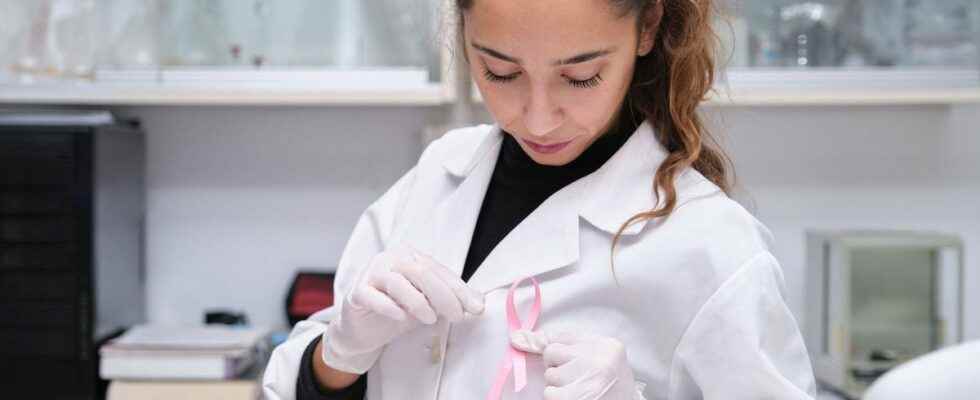Published ,
Reading 3 mins.
A new drug, trastuzumab deruxtecan, could be a major advance in the treatment of HER2-positive metastatic breast cancer, which affects 20% of the women concerned, but not only.
This would be the study “the most positive in the history of breast cancer” according to the conclusions of this work carried out by Dr. Javier Cortés, director of the Barcelona International Breast Cancer Center (IBCC) and his colleagues. Their results relate to the drug trastuzumab deruxtecan (Enhertu), studied in the case of HER2-positive metastatic breast cancer. They published in the New England Journal of Medicine.
A real homing missile against cancer
This treatment is the result of a combination of a drug (trastuzumab) and chemotherapy (deruxtecan), which is called a Trojan horse in medical jargon. The first molecule precisely reaches the malignant cells, where the HER2 protein, responsible for the accelerated development of the tumor, is expressed. Then the chemotherapy is released in a localized manner, which destroys the cancerous cells and preserves as many healthy cells as possible.
Promising results
This drug has been tested in 524 women with HER2+ metastatic breast cancer whose disease progresses after initial treatment with HER2 antibodies (Herceptin) and a taxane (chemotherapy) – this combination is the gold standard initial treatment for women with HER2+ breast cancer. This new drug was compared to the standard treatment: trastuzumab emtansine (Kadcyla).
Among these patients with advanced and progressing cancer, the results show clear progress, with “a percentage of patients without disease progression at 12 months of 75.8% with trastuzumab deruxtecan and 34.1% with trastuzumab emtansine (which is the standard treatment)” explain the authors.
What’s more, “the percentage of patients alive at 12 months was 94.1% with trastuzumab deruxtecan versus 85.9% with trastuzumab emtansine”.
Less disease progression
“Among patients with HER2-positive metastatic breast cancer previously treated with trastuzumab and a taxane, the risk of disease progression or death was lower in those who received trastuzumab deruxtecan than in those who received trastuzumab emtansine “summarizes the study.
In fact, the results obtained with this drug have been “so positive“that trastuzumab deruxtecan has become, according to the IBCC, the new standard of second-line treatment for patients with HER2-positive breast cancer.
Note however that this treatment is more often associated with pneumonitis, lung inflammation, in 10.5% of cases against 1.9% in patients following the standard treatment. But according to the study, none of these side effects was too severe (not grade 3 or 4) and reinforced follow-up made it possible to control it for the majority of patients.
A hope for the cure of the disease
Dr. Cortés, who participated in this work, believes “this drug is so innovative and improves the prognosis compared to current standard treatment that we could be in the presence of the most active drug in the history of breast cancer.” and that this treatment could “cure the disease in some patients, because the tumor disappears in 16% of cases”.
Trastuzumab deruxtecan was first offered to the most severe cases of the disease, but according to Dr. Cortés, “this treatment is already being studied for use in people with localized tumors, without metastases” and very promising results are observed in tumors where the presence of HER2 is lower. As with all new anti-cancer drugs, the treatment is first tested on the most advanced forms of cancer, before being offered at earlier stages if it has demonstrated its effectiveness.
Consult an oncologist online
Already being studied for other types of cancer
For Pascal Soriot, boss of the AstraZeneca group, the laboratory which produces the combined molecule in association with the pharmaceutical company Daiichi Sankyo, “we are convinced that trastuzumab deruxtecan can bring a profound change in the treatment of so-called HER2 positive breast and gastric cancers, a genetic mutation producing a protein that boosts the proliferation of cancer cells”.
New Trojan horses with new antibodies are already being studied, with new targets and new “lethal payloads” to attack different types of cancers, such as lung cancer or gastric or colorectal cancers. A new hope for all cancer patients.
